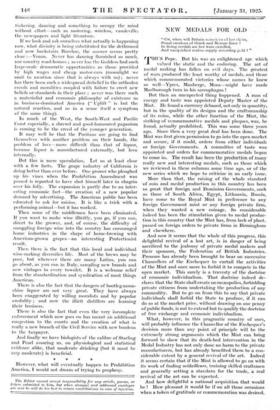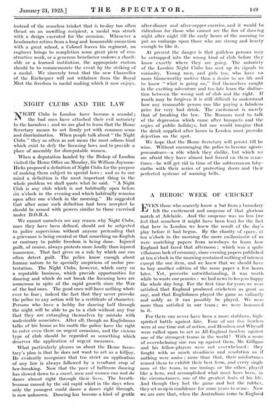NEW MEDALS FOR OLD
"Oa, when will Britain ecnscicus cf l:er cla:m, Stand emulous of Greek and Rcman fame ? In living medals see her wars enrolled, And vanquished realms supply recording geld ?
THUS Pope. But his was an enlightened age which valued the static and the enduring. The art of medal making has fallen on evil days. The greatest of wars produced the least worthy of medals, and those which commemorated victories whose names he knew so well—Ypres, Mauberge, Mons—might have made Marlborough turn in his sarcophagus !
But then an unexpected thing happened. A man of energy and taste was appointed Deputy Master of the Mint. He found a currency debased, not only in quantity, but in the quality of its designs and the craftsmanship of its coins, while the other function of the Mint, the striking of commemorative medals and plaques, was, he found, actually prohibited. This was some three years ago. Since then a very great deal has been done. The Mint was first given permission to go into the open market and secure, if it could, orders from either individuals or foreign Governments. A committee of taste was appointed and orders for commemorative medals began to come in. The result has been the production of many • really new and interesting medals, such as those which we reviewed in these columns some time ago, or of the new series which we hope to criticize in an early issue.
More and that, the raising of the whole standard of coin and medal production in this country has been so great that foreign and Dominion Governments, such as those of South Africa, Egypt, Lithuania, Russia, have come to the Royal Mint in preference to any foreign Government mint or any foreign private firm, when they wanted a new coinage. So considerable indeed has been the stimulation given to medal produc- tion in this country that the Mint has, from lack of plant, passed on foreign orders to private firms in Birmingham and elsewhere.
And now it seems that the whole of this progress, this delightful revival of a lost art, is in danger of being sacrificed to the jealousy of private medal makers and their sponsors, the Federation of British Industries. Pressure has already been brought to bear on successive Chancellors of the Exchequer to curtail the activities of the Mint and once more to forbid it to compete in the open market. This surely is a travesty of the doctrine of economic individualism. That doctrine indeed de- clares that the State shall create no monopolies, forbidding private citizens from undertaking the production of any commodity. But to go on from this to say that private individuals shall forbid the State to produce, if it can do so at the market price, without drawing on one penny of public funds, is not to extend but to qualify the doctrine of free exchange and economic individualism.
What, however, in this pragmatic country of ours, will probably influence the Chancellor of the Exchequer's decision more than any point of principle will be the extremely strong arguments which the Mint can bring forward to show that its death-bed intervention in the Medal Industry has not only done no harm to the private manufacturers, but has already benefited them to a con- siderable extent by a general revival of the art. Indeed it seems certain that if the Mint is allowed to go on with its work of finding midailleurs, training skilled craftsmen and generally setting a standard for the trade, a real revival of the art can be expected.
And how delightful a national acquisition that would be! How pleasant it would be if on all those occasions when-a token of gratitude or commemoration was desired. instead of the senseless trinket that is to-day too often thrust on an unwilling, recipient, a medal was struck with' a design executed for the occasion. Whenever a headmaster retires from a long and honourable connexion with a great school, a Colonel leaves his regiment, an engineer brings to completion some great piece of con- structive work, or a generous benefactor endows a charit- able or a learned institution, the appropriate custom should be to commemorate the event by the striking of a medal. We sincerely trust that the new Chancellor of the Exchequer will not withdraw from the Royal Mint the freedom in medal making which it now enjoys.















































 Previous page
Previous page